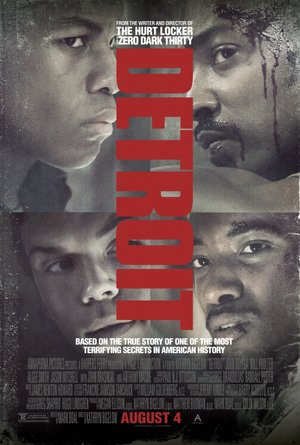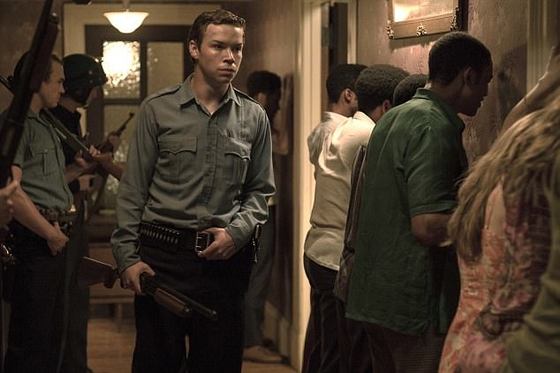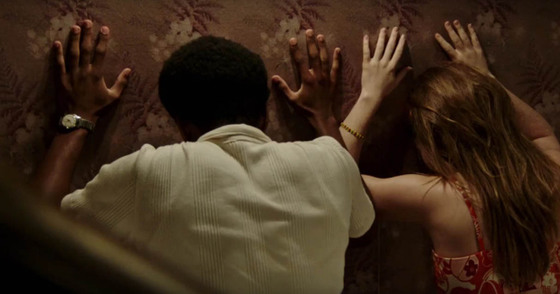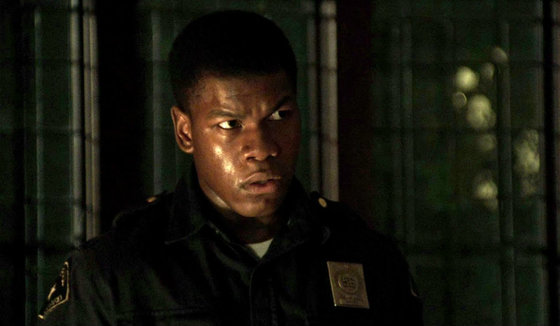Detroit is one those movies that connects us to yet another one of our “embarrassing moments in humanity” and shows us that despite how much everything around us has changed, the most important things, the way we treat each other, has sadly and dangerously remained status quo.
Directed by Kathryn Bigelow (The Hurt Locker, Zero Dark Thirty), Detroit tells the story of three African American men killed in cold blood at the Algiers Motel during the city’s infamous riots and civil rights movement in 1967. The film tackles the sorted events by lacing the narrative with real footage and news clips from the period, giving the film a documentary feel, which at times takes away story being told and establishes an uneven tone that only suffers from the excessive length.
Beginning with a raid on a night club, the action escalates when a uniformed officer, Krauss (Will Poulter), shoots an unarmed man in the back during a looting incident. In a scary moment that act as foreshadowing to current events, shows just how little things have changed since this horrific night, Krauss is given a slap on the wrist and sent back out on the street. After all, Detroit is erupting in chaos. Unfortunately, the racist Krauss thinks he has a responsibility to maintain the balance.
When shots are fired from the Algiers Motel, cops storm the building in aggressive defense, determined to find the shooter. At the time the Algiers is occupied by mostly black teens, except for a couple of white girls. Trigger-happy Kraus shows up first, kills a dude and then starts lining people, terrorizing and threatening everyone to give up the gunman or everybody is gonna die. At first it’s a game played by the mostly white cops, but it quickly gets out of hand.
Detroit is loaded with an all-star cast, but unfortunately the talent is better on paper than it is on film. Poulter is the clear standout of the film, delivering a chilling and intense performance. John Boyega (Star Wars: The Force Awakens) plays a security guard trying to maintain harmony, but ultimately get caught on the wrong side of the tensions. Anthony Mackie plays a Vietnam vet come home to return to a normal life, while newcomer Algee Smith plays the former lead singer of an up and coming Motown band, who has been blinded by the promise of fame, but now sees the true racial division.
They’re all great even if none of them really given a lot of time to truly get to know their characters. The performances from the actors are real, raw and authentic in every aspect but never enough to burst off the screen. This is where the back and forth with the real-life footage creates a bit of a wedge in the human connection. The events are horrific. It’s hard to watch and that fear is Bigelow’s driving force. While the actual events are unknown, despite multiple accounts, the film, written by her go-to screenwriter Mark Boal, picks a clear side.
Having come a long way since Point Break, Bigelow has established herself with real life event movies. She’s on point here when it comes to giving us a glimpse of this night, as the events unfolding in front of us, just as she did with Zero Dark Thirty. But it seems here she is so determined on telling the facts of the case that she sacrifices good performances in order to give us a slice of reality.
But with a way-too-long 140-plus minute running time and a plethora of characters to keep track of, the story is just too big for a feature film and requires patience. It’s a powerful movie, but too often feels like mere highlights and feels like it would have been better as a miniseries. Despite this, Bigelow does her best to tame Boal’s bloated script to a digestible film and the results are mostly good.
Overall, Detroit is certainly a good film that relays an important story that sadly hammers home how little things have change and how far we have to in our battle with racism. Playing out like an expensive reenactment of the tragedy, though, it feels like there is too much story for a feature film.














Comments on this entry are closed.